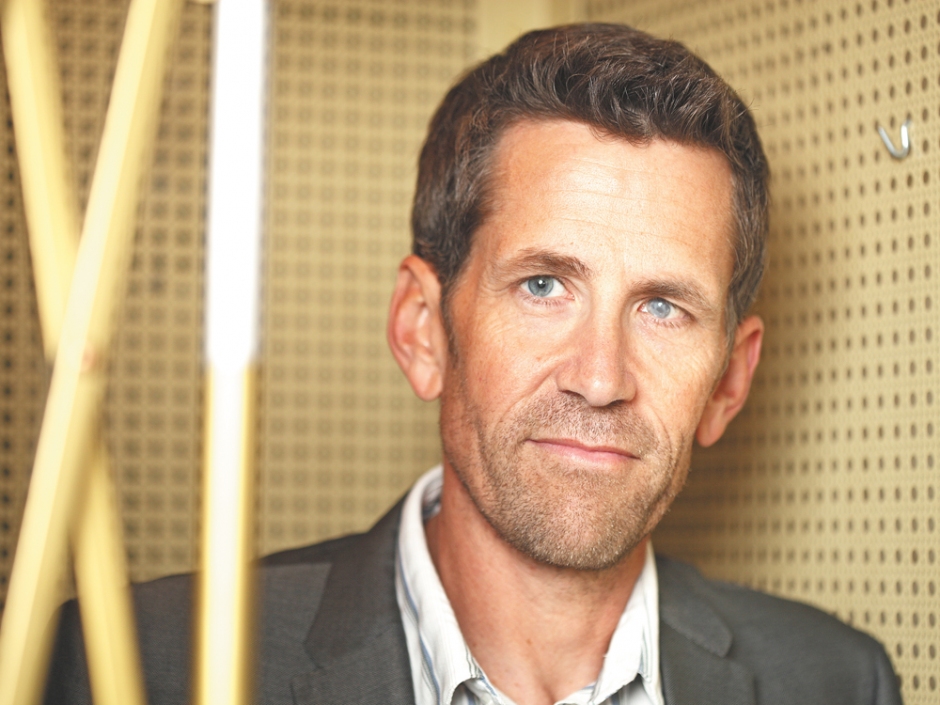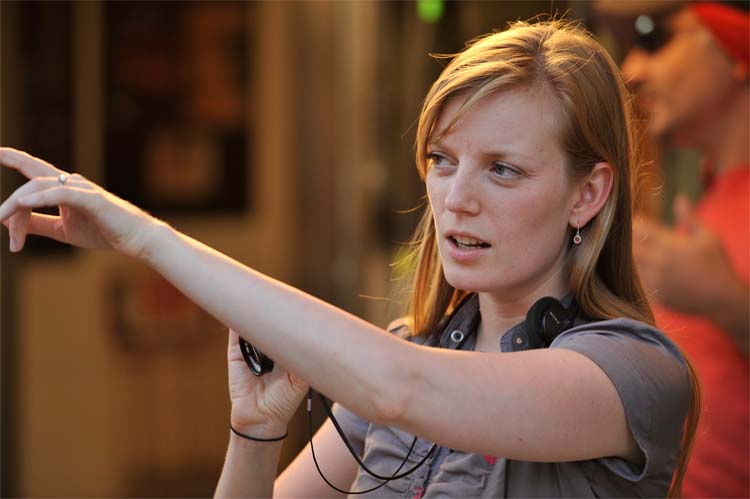Jess Walter appeared on The Bat Segundo Show #465. He is the author of Beautiful Ruins and previously appeared on The Bat Segundo Show #163
Listen: Play in new window | Download
 This episode of The Bat Segundo Show is brought to you by Audible.com. If you want to listen to Jess Walter’s Beautiful Ruins, The Financial Lives of the Poets, or The Zero (all available at Audible.com), and help keep this show going, sign up for a free audiobook and a 30 day trial. Use this handy link: http://www.audiblepodcast.com/bat
This episode of The Bat Segundo Show is brought to you by Audible.com. If you want to listen to Jess Walter’s Beautiful Ruins, The Financial Lives of the Poets, or The Zero (all available at Audible.com), and help keep this show going, sign up for a free audiobook and a 30 day trial. Use this handy link: http://www.audiblepodcast.com/bat
Condition of Mr. Segundo: Contemplating a trip to Italy to push his debauchery to the next level.
Author: Jess Walter
Subjects Discussed: The folly of great quests, whether true quests are measured in hope, not writing the same novel twice, starting a novel in 1997 and carrying on for the next fifteen years, Scientology, the “Psych!” moment in fiction, early versions of Beautiful Ruins, Walter’s experience as a cop reporter, Over Tumbled Graves, having to write several novels to get to the end of Beautiful Ruins, the importance of hovering central questions, hiking the Cinque Terre, having a 26 page explosive breakthrough in Italy, imposing a generous structure, the problems that come when you get sick of your characters after working on a novel for a long time, curing a novel’s frustrations by writing another novel, responding to the 2008 economic meltdown through fiction, plummeting house tax assessments, funneling anxieties into The Financial Lives of the Poets‘s Matt Prior, existing in a bubble, Albert Camus’s “The Wager of Our Generation,” marrying social concerns with entertainment, “table-leg sideburns” and other poetically entertaining descriptions, big fat American novels, the advantages of being unaware of the publishing industry or not having a MFA, Walter’s dubious bachelor’s degree, being a laugh whore, introducing social dilemmas to avoid cracking jokes all the time, pegging a writer’s DNA based on her ten favorite books, Kurt Vonnegut, Gabriel Garcia Marquez, Joan Didion’s The White Album, secret trashy books that writers are inspired by, Frederick Forsyth’s The Odessa File, Clint Eastwood’s The Eiger Sanction, 1970s thrillers, the dramatic benefits of evil Nazi doctors, surprises of motive, the present literary stigma on melodrama, Martin Amis’s Lionel Asbo, being fond of riffs, Shane, Dee Moray and Rebecca De Mornay, the origins of names, Robert Evans, description which mimics Hollywood screenplay description, virtual adultery in The Financial Lives of the Poets and “pining for the digital hit” in Beautiful Ruins, capturing digital life in fiction, accidental zeitgeist moments, observing other people, characters who want to be younger better versions of themselves, writing short stories about fatherhood, looking for the specific angle for a novel, journalism vs. fiction, senility, the magpie method of novel writing, the Crispin Glover movie about the Donner Party, researching Richard Burton, Burton on The Dick Cavett Show, Louis Menand’s inspirational phrase, Robert Sellers’s Hellraisers: The Inebriated Life and Times of Richard Burton, Peter O’Toole, Richard Harris & Oliver Reed. the freedom of writing about the dead, Michael Deane’s abandoned first chapter, “We want what we want,” using narrative fragments and “bad writing” to find poignancy within characters, feeling genuine about a story, writing a section of Beautiful Ruins without using a comma, deliberate efforts to write the world’s worst poetry, when people don’t think that they are the villains of their own story, inevitable actions, responding to Allegra Goodman’s charges about extending beats too long, pushing hard on the emotional buttons, the impossibility of the perfect novel, the inevitability of bad writing, reality shows based on Web concepts, collisions between high and low culture, emotions and language, the beauty of faded art, artistic compromises, and whether writing can ever fully capture romance.
EXCERPT FROM SHOW:
Correspondent: I’d like to start off with a sentiment that’s expressed late in the book. Because I think it really encapsulates what this novel is about. “But aren’t all great quests folly? El Dorado and the Fountain of Youth and the search for intelligent life in the cosmos — we know what’s out there. It’s what isn’t that truly compels us.” And in this passage, you suggest that true quests aren’t measured in time and distance. They’re actually measured in hope. So to my mind, this is also a very good description of writing.
Walter: Yeah.
Correspondent: So I’m wondering how you counter this idea of knowing what’s out there while writing Beautiful Ruins. This notion of the quest that guided all these considerable styles, considerable characters, considerable decades, considerable locations — all crammed quite majestically into a 350 page narrative: what steps do you take to find that quest? And to make sure you’re not writing the same novel twice?
Walter: Well, I haven’t had a problem writing the same novel twice. The novel, I think, is very much a reflection of the way I work and the things that I think are important in fiction writing. And that passage you talk about, this novel I started in 1997 and I kept putting it down. So it was that journey. It was very much one of those quests that took me to different styles of writing, to different places, to Edinburgh, to Italy, to England, to different places in the United States. And every time I’d come back to it, the thing itself would kind of be about storytelling. Those “beautiful ruins” of the title are, to me, the artifacts that make up this piece. The lives are reflected in the stories that we tell about ourselves. So it was a bit of a meta experience for me, writing this. I kept feeling as if I was commenting upon the writing of the book itself through this big storytelling voice, this third-person omniscient, where I was able to just grab a character and tell you everything you needed to know about them. That idea of storytelling kept coming around in a big grand way.
Correspondent: 1997. So what shape, what direction, was what became Beautiful Ruins like back then? I ask because there’s this tantalizing bit at the very beginning. “Oh, Jess is going to write a Scientology satire, a sendup!” And then “Psych!” No, it’s that story at all. Nicely mimicking Lydia’s parallel story near the end. So this would explain, if you worked on it for so many years, why it became so mammoth and complex. But I’m wondering what the prototypical version of this looked like.
Walter: Yeah. I like the idea of having the word “Psych!” every three or four pages. Psych! You thought it was going to be this.
Correspondent: (laughs)
Walter: We may have to talk with the audio book people about that. I’ll just lean over the actor’s shoulder and say “Psych!” every few minutes.
Correspondent: That would probably be a good way to read the David Foster Wallace footnotes.
Walter: It would.
Correspondent: Psych!
Walter: Psych! But I went to Italy in 1997 before I published any novels. And I’d been working on two novels that would fail. That would just never be published. And this was my third failed novel in my mind. It was called at the time The Hotel Adequate View. My mom had been diagnosed with cancer. And I originally thought I would write a magical realism piece about a woman dying of cancer who goes to this small Italian village where, for some mystical reason, her cancer stops. And it was really just a way for me to take my mom to this place she’d never gotten to see. And then I was sort of tweaking with the idea. I didn’t want to write that book about my mom. But I still had this woman arriving at this village and this man Pasquale Tursi seeing her. And I had to figure out: “Who was this woman?” And my first book had been made into a miniseries on CBS. Ruby Ridge, in 1995. So I’d had my first dealings with Hollywood. And so I thought, “She’s an actress.” So in 1997, I had this idea she was an actress. I had already looked up Cleopatra. I thought she was part of that. I even had the parallel stories. But I really just hit a wall. I didn’t know how to write that novel then. It was more ornate than I think I was capable of doing. So I stepped aside and I wrote Over Tumbled Graves, which was a crime novel that I outlined. Like a lot of young writers, I was really teaching myself how to write a novel. And I didn’t have the chops then to write this book.
Correspondent: So out of this early version came this fixation on serial killers. That’s quite interesting. (laughs)
Walter: I had been a cop reporter.
Correspondent: Yeah, I know.
Walter: So I turned — I did what every young writer does. Write what you know. You don’t know Italy. You don’t know Hollywood. I lacked the confidence, I guess, to finish it. And I also didn’t know where the story was going. I mean, it becomes about the span of these lives. And I hadn’t had as much life as I’ve had now. I hadn’t had that span. So I wrote Over Tumbled Graves. When I finished it, I went back to The Hotel Adequate View. Still couldn’t crack it. Wrote Land of the Blind. Went back to it. Still couldn’t crack it. Wrote Citizen Vince. This kept happening on and on and on. Finally in 2008 — July of 2008 — I finished a draft of it. It was now called Beautiful Ruins. I gave it to a friend of mine. And I read it. And it still didn’t work. And so I set it aside and I wrote The Financial Lives of the Poets in about eight months. As a kind of palate cleanser. Because by now, it had grown to this puzzle with all these pieces that I could sort of intuit how they fit together. But I couldn’t quite get them to work in that way.
Correspondent: This is fascinating to me. So you had to write several novels to get to the end of this. To get to the end of the draft.
Walter: Yeah, right.
Correspondent: This suggests to me, perhaps, that, because you were mimicking several styles within the course of this book, each incremental step forward was almost a new style. Almost like a mini-novel, I suppose. Is that safe to say?
Walter: You know, not really. Because I would go back to the beginning…
Correspondent: Oh! Okay.
Walter: …and tear it up from the beginning. There’s not a sentence that exists which was in that original version.
Correspondent: Wow.
Walter: Every time I would go back to it, I’d be left with Pasquale and Dee. Most of the rest of it didn’t quite make sense to me. Michael Deane exists in some form. I probably discovered Richard Burton in about 2006, that I wanted to write about him. But there were just odds and ends and bits and pieces that would make their way into it. But it was more — it really was like a 3D puzzle that fits together. And while it’s sort of complex in structure, I never wanted it to be complex in narrative. I always wanted it to be a story that pushed forward. And there’s a central question. This couple meets. And are they going to get back together fifty years later? And as long as that was hovering over it, I felt like I could do all these other pieces. So I went to Italy again after I finished The Financial Lives of the Poets. I went to speak. A friend was teaching there and I went to speak at his class. And I hiked the Cinque Terre again. And I had this burst of understanding of what was missing. I stayed up and wrote 26 pages of my journal — my writing journal — of notes. And the last note I wrote was “It’s morning. The birds are chirping. I’ve stayed up all night.” And in there was a kind of outlined description of what I thought the novel should do. I didn’t follow all those rules. But it was a nice path to get me through this last burst of writing. And when I finished it this last time, I had a sense that this is it. This is the book that I wanted to write before I knew what it was.
Correspondent: So would you say, during this period of writing this novel and also writing several other novels, that really it was a matter, with Beautiful Ruins, of giving yourself permission to set down at least a tentative structure so you could actually push forward? Was that really the breakthrough with this?
Walter: Well, every writer knows that feeling of something that fails. And I never thought it was going to succeed. Honestly. Every time I hit a wall with it, I thought, “Well, that thing’s done.” Because I’ve had other novels that peter out after however many pages. So it wasn’t that I lacked the structure. Because I thought I knew what it was. It just didn’t work. And it just wasn’t right. And I always write two or three things at once. It’s my one superpower. That I’m a really good driver. So I write poems at the same time that I write essays, at the same time I write reviews, and I just sit at the desk. And if I’m stuck on one thing, I work on something else. So I’ve got two novels going now. And I don’t know which one will grab me.
Correspondent: A race to the finish.
Walter: Yeah. And I might finish it and decide it doesn’t work. But the structure I imposed on it the last time was a little more generous structure. I think I was even more indulgent with myself and trying on the reader in earlier drafts. And this time I said, I’m going to make sure that you’re rewarded when you have to start over and meet new characters. That when things come back around, there’s a payoff. And I knew that Alvis Bender, this writer from World War II, would figure in it. And I knew that I wanted to have a pitch for a film about the Donner Party. I knew these pieces. And so I trimmed a lot of those and made them shorter so it was less trying on the reader. I tried to make the connections more complete. And I always sensed that the novel would make or break on the last chapter when I had this idea, that I wrote in my journal in Italy in 2008, that everything would swirl back around in this big present tense.
The Bat Segundo Show #465: Jess Walter II (Download MP3)




